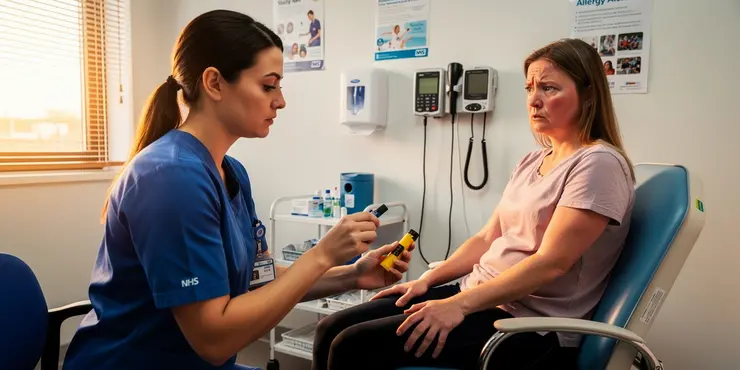
Find Help
More Items From Ergsy search
-
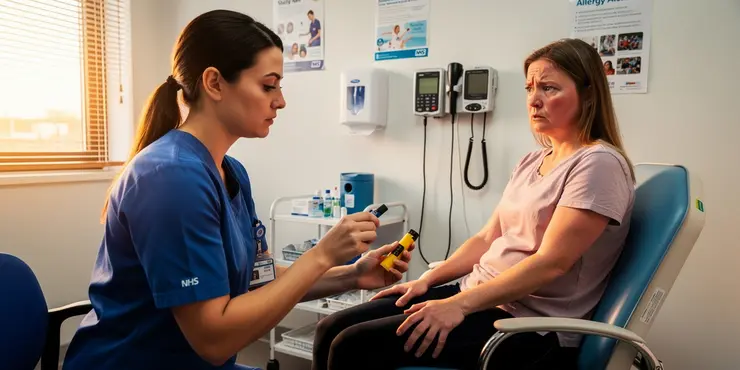
Is epinephrine the only treatment for severe nut allergy reactions?
Relevance: 100%
-

Is there a cure for nut allergies?
Relevance: 61%
-

What are Nut Allergies?
Relevance: 61%
-

Are nut oils safe for people with nut allergies?
Relevance: 60%
-
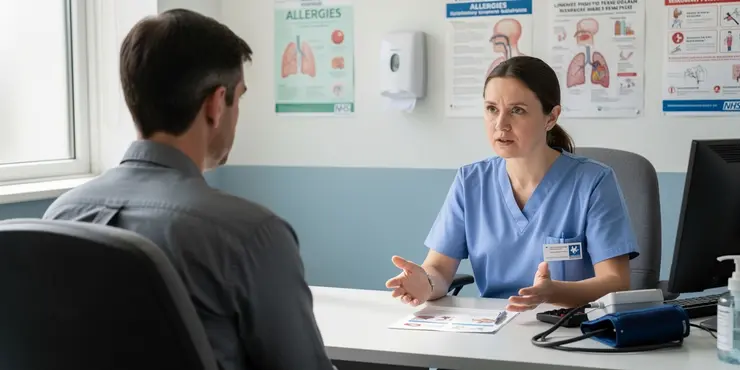
What are the symptoms of a nut allergy?
Relevance: 57%
-

Can nut allergies develop later in life?
Relevance: 56%
-

How can nut allergies be managed?
Relevance: 55%
-

What types of nuts can cause allergies?
Relevance: 54%
-

What should I do if I think I have a nut allergy?
Relevance: 53%
-
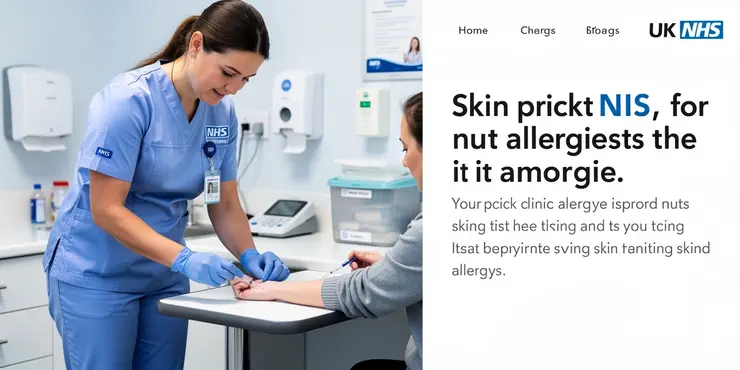
How is a nut allergy diagnosed?
Relevance: 53%
-

Can nut allergies be outgrown?
Relevance: 51%
-

What should I tell my family and friends about my nut allergy?
Relevance: 51%
-

What is the difference between a nut allergy and intolerance?
Relevance: 49%
-

Can tree nuts and peanuts cause cross-reactions?
Relevance: 41%
-

Is it safe to eat foods labeled as 'may contain nuts'?
Relevance: 39%
-

What are Dairy Allergies?
Relevance: 35%
-

Are there any recent treatments or research developments for nut allergies?
Relevance: 33%
-
How can I prevent cross-contamination with nuts in the kitchen?
Relevance: 32%
-

What foods should I avoid if I have a nut allergy?
Relevance: 32%
-

How are food allergies managed in UK schools?
Relevance: 31%
-

Does Ozempic cause allergic reactions?
Relevance: 30%
-

Can I get the COVID jab if I have allergies?
Relevance: 28%
-

What is anaphylaxis?
Relevance: 28%
-
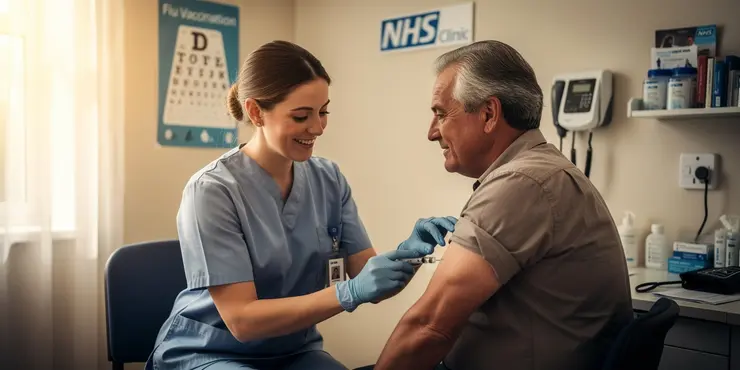
What if I have an egg allergy, can I still get the flu vaccine?
Relevance: 27%
-

Can UK spiders cause allergic reactions?
Relevance: 27%
-

Can patients with drug allergies still take heart disease medications?
Relevance: 26%
-
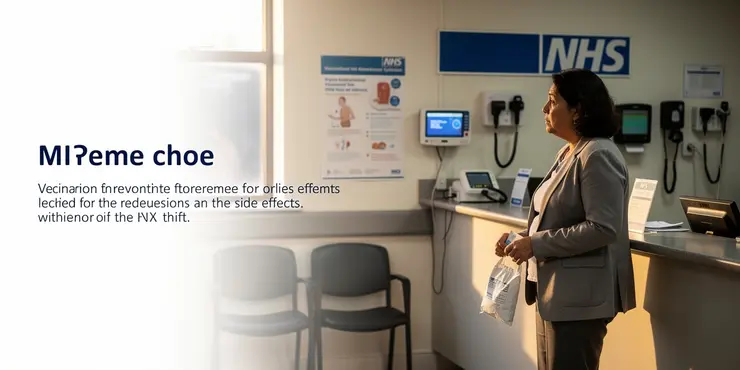
What should be done if severe side effects occur?
Relevance: 24%
-

Dealing with Seasonal Allergies
Relevance: 23%
-
Can orange juice be allergenic?
Relevance: 22%
-
Can someone have a reaction to a mismatched blood transfusion?
Relevance: 20%
-

Think Pharmacy: Introduction for Bites and Stings
Relevance: 19%
-

NHS Acute Care Anaphylaxis
Relevance: 19%
-

Can children with nut allergies safely attend school?
Relevance: 19%
-

How does decreased reaction time affect elderly drivers?
Relevance: 19%
-

What foods can trigger nettle rash?
Relevance: 19%
-
What should I do if I experience severe side effects from Wegovy?
Relevance: 18%
-

What was the global reaction to the US's decision to leave WHO?
Relevance: 18%
-

Can children get nettle rash?
Relevance: 17%
-

Is it possible to be allergic to the sun?
Relevance: 16%
-

Do pets contribute to hay fever?
Relevance: 16%
Introduction
Nut allergies are among the most common food allergies and can lead to severe allergic reactions called anaphylaxis. For individuals with severe nut allergies, immediate treatment is crucial to manage symptoms and prevent life-threatening complications. One of the most well-known treatments is epinephrine, commonly delivered via an auto-injector. However, people often wonder if epinephrine is the sole treatment for managing such severe reactions.
What is Anaphylaxis?
Anaphylaxis is a severe, potentially life-threatening allergic reaction that can occur rapidly. Symptoms can include difficulty breathing, swelling, hives, a drop in blood pressure, and even loss of consciousness. In the case of nut allergies, anaphylaxis can occur just minutes after consuming a nut product, highlighting the necessity for immediate response.
The Role of Epinephrine
Epinephrine, also known as adrenaline, is the first-line treatment for anaphylaxis. It works by rapidly reversing the symptoms of an allergic reaction. Epinephrine constricts blood vessels, raises blood pressure, and reduces swelling, effectively easing breathing difficulties and itchiness. For individuals at risk of severe allergic reactions, carrying an epinephrine auto-injector, such as an EpiPen, Anapen, or Jext, is essential.
Is Epinephrine the Only Treatment?
While epinephrine is the cornerstone of emergency treatment for anaphylaxis, it is not the only component of managing severe allergic reactions. Antihistamines and corticosteroids are often used as adjunctive treatments. These medications can help alleviate symptoms such as hives and swelling but are not substitutes for epinephrine.
After administering epinephrine, calling emergency services is crucial. In the UK, dial 999 to ensure timely medical assistance. Medical professionals will assess the situation and may provide additional treatments such as oxygen, intravenous fluids, or further doses of epinephrine if necessary. Continuous monitoring in a medical setting helps manage any biphasic reactions, where symptoms can reoccur after being treated initially.
Long-term Management and Prevention
For individuals with severe nut allergies, long-term management strategies are equally important. These may involve working with allergy specialists to develop a comprehensive action plan, regularly checking expiry dates of auto-injectors, and teaching friends and family how to administer epinephrine. Avoidance of trigger foods and reading food labels carefully remain key preventive measures.
Conclusion
In summary, while epinephrine is the primary treatment for severe nut allergy reactions, it is part of a broader management plan that includes the use of antihistamines, emergency medical services, and preventive measures. Awareness and preparedness are critical in ensuring the safety and well-being of individuals with severe nut allergies. Always consult healthcare professionals for personalized advice and treatment strategies.
Introduction
Nut allergies are common. They can cause very bad reactions called anaphylaxis. If someone has a severe nut allergy, they need quick treatment. This stops the reaction and keeps them safe. A well-known treatment is epinephrine. It is usually given with an auto-injector. People often ask if epinephrine is the only way to treat these reactions.
What is Anaphylaxis?
Anaphylaxis is a very serious allergic reaction. It can happen fast. Symptoms include trouble breathing, swelling, hives, low blood pressure, and passing out. With nut allergies, anaphylaxis can happen just minutes after eating nuts. This is why quick action is necessary.
The Role of Epinephrine
Epinephrine, also called adrenaline, is the main treatment for anaphylaxis. It works fast to stop the symptoms. Epinephrine helps by narrowing blood vessels, raising blood pressure, and reducing swelling. This makes breathing easier and stops itching. People at risk carry an epinephrine auto-injector like an EpiPen, Anapen, or Jext.
Is Epinephrine the Only Treatment?
Epinephrine is important for treating anaphylaxis, but it is not the only treatment. People also use antihistamines and corticosteroids. These help with symptoms like hives and swelling. But, they do not replace epinephrine.
After using epinephrine, call for emergency help. In the UK, dial 999 for an ambulance. Doctors will check and might give more treatments like oxygen or fluids. They may give another dose of epinephrine if needed. Watching the person closely in a hospital is important, as symptoms can come back.
Long-term Management and Prevention
People with severe nut allergies need a long-term plan. This plan can include working with allergy doctors. It is important to check the expiry dates on auto-injectors. Teaching friends and family how to use an epinephrine injector is also important. Avoiding nuts and reading food labels are key ways to stay safe.
Conclusion
In short, epinephrine is crucial for treating severe nut allergy reactions. It is part of a bigger plan. This plan includes using other medications, calling emergency services, and taking steps to avoid nuts. Being aware and ready is essential for keeping people with severe nut allergies safe. Always talk to healthcare professionals for advice and treatment plans suited to you.
Frequently Asked Questions
What is epinephrine used for in nut allergies?
Epinephrine is used for treating severe allergic reactions, known as anaphylaxis, caused by nut allergies.
Is epinephrine the only treatment available for severe nut allergy reactions?
While epinephrine is the first-line treatment for anaphylaxis, additional treatments such as antihistamines and corticosteroids may be used as supportive care.
Why is epinephrine considered the first-line treatment for anaphylaxis?
Epinephrine works quickly to reverse the symptoms of anaphylaxis by constricting blood vessels, increasing heart rate, and opening airways.
What should be done after administering epinephrine for a nut allergy reaction?
After administering epinephrine, one should seek immediate medical attention, as symptoms can recur and further treatment might be necessary.
Are there any alternatives to epinephrine for treating anaphylaxis?
There are no true alternatives to epinephrine for anaphylaxis; it is the only medication that can quickly halt severe allergic reactions.
Can antihistamines replace epinephrine in treating severe nut allergy reactions?
No, antihistamines cannot replace epinephrine. They may help with minor symptoms but do not treat the life-threatening aspects of anaphylaxis.
Can corticosteroids be used instead of epinephrine for nut allergy reactions?
Corticosteroids are not a substitute for epinephrine; they may be used as an additional treatment to help reduce inflammation but are not immediate life-saving medications.
What role do inhalers play in treating severe nut allergy reactions?
Inhalers may help alleviate respiratory symptoms but cannot replace epinephrine in treating anaphylaxis.
What should I do if I don't have epinephrine and experience a severe nut allergy reaction?
Seek emergency medical help immediately, as prompt treatment is critical in anaphylaxis situations.
How quickly does epinephrine work after being administered for a severe allergic reaction?
Epinephrine usually works within minutes to reduce the symptoms of anaphylaxis.
Can multiple doses of epinephrine be given during a severe allergic reaction?
Yes, if symptoms persist and medical help has not yet arrived, a second dose may be administered according to medical advice.
How does epinephrine help during anaphylaxis?
Epinephrine helps by counteracting the effects of an allergic reaction through vasoconstriction, bronchodilation, and increasing heart rate.
Is it safe to carry an epinephrine auto-injector if I have a nut allergy?
Yes, individuals at risk of anaphylaxis should carry an epinephrine auto-injector at all times for emergency use.
Can children with nut allergies use epinephrine auto-injectors?
Yes, there are pediatric versions of epinephrine auto-injectors designed for safe use in children.
Do I need a prescription to obtain an epinephrine auto-injector?
Yes, a prescription is typically required to obtain an epinephrine auto-injector.
Are there side effects of using epinephrine during an allergic reaction?
Common side effects may include increased heart rate, anxiety, and dizziness, but these are usually outweighed by its life-saving benefits.
How should I store my epinephrine auto-injector?
Epinephrine should be stored at room temperature and not exposed to extreme temperatures to maintain its effectiveness.
What is anaphylaxis?
Anaphylaxis is a severe, potentially life-threatening allergic reaction that can occur within seconds or minutes of exposure to an allergen.
Why is it important to seek medical attention even after using epinephrine?
Medical evaluation is essential because symptoms can recur, and further treatment and observation are often necessary.
Can epinephrine be used for other types of allergic reactions besides nut allergies?
Yes, epinephrine can be used for any severe allergic reaction or anaphylaxis, not just those caused by nut allergies.
How does epinephrine help with nut allergies?
Epinephrine helps when someone has a very bad allergic reaction to nuts. This bad reaction is called anaphylaxis.
Is there more than one way to help with bad nut allergies?
If someone has a bad allergic reaction (called anaphylaxis), the first medicine doctors use is called epinephrine. Other medicines, like antihistamines and steroids, can help too.
Why is epinephrine the first choice to treat a bad allergic reaction?
Epinephrine is medicine that helps when someone has a really bad allergic reaction. This is called anaphylaxis. Here are some reasons why it is the first medicine to use:
- Epinephrine works fast to help people breathe easier.
- It can stop the allergic reaction from getting worse.
- It helps keep the heart beating well.
If you or someone else has a serious allergy, it's good to have an epinephrine auto-injector. This is a tool that makes it easy to give the medicine quickly.
If you don’t have epinephrine, call for help right away.
Epinephrine helps fast when someone has a severe allergy. It makes blood move better by making blood vessels smaller. It also makes the heart beat faster and helps you breathe easier.
What to do after giving epinephrine for a nut allergy?
If you give someone an epinephrine shot because of a nut allergy, you should:
- Call 911 or your emergency number right away.
- Keep the person calm and stay with them.
- Make sure they are lying down or sitting comfortably.
- Help them to breathe slowly and stay calm.
- If they have another shot and need it, give it to them.
It is important to go to the hospital, even if they feel better. This is to make sure they are safe.
Tools like picture guides and simple videos can be helpful to understand these steps.
If you use epinephrine, go to the doctor or hospital right away. This is important because your symptoms could come back and you might need more help.
Can we use something else instead of epinephrine for allergic reactions?
Epinephrine is the only medicine that stops really bad allergic reactions fast. There is nothing else that works like it.
Can you use allergy medicine instead of epinephrine for a bad nut allergy?
If someone has a strong nut allergy, they might have a serious reaction. This is called anaphylaxis. It can be very dangerous.
When this happens, people usually use something called epinephrine. It's a special medicine that helps very quickly. It can save a person's life.
Allergy medicine (antihistamines) is different. They help with mild allergies like sneezing or itching. But they do not work fast enough for serious reactions.
If someone has a serious nut allergy, always have epinephrine ready. If there's an emergency, call 911 or get help right away.
Some ways to help understand are:
- Use simple words.
- Watch videos about allergies.
- Ask your doctor or nurse to explain.
- Practice using an epinephrine injector on a trainer device.
No, antihistamines cannot take the place of epinephrine. Antihistamines might help with small symptoms, but they do not treat the dangerous parts of a severe allergic reaction called anaphylaxis.
Can we use a different medicine instead of epinephrine for nut allergies?
If someone has a nut allergy, they might get sick if they eat nuts. People often use a special medicine called epinephrine for help. Some people ask if they can use another medicine, like corticosteroids, instead of epinephrine.
Epinephrine works fast to help people who have a bad reaction. Corticosteroids work slower and are not a replacement for epinephrine when someone has a nut allergy reaction.
If you have a nut allergy, talk to a doctor. They can tell you what medicines are best to keep you safe.
It can be helpful to have reminder tools. Tools like simple notes on when to use medicine can help you remember what to do.
Corticosteroids are not the same as epinephrine. They can help with swelling but won't save a life quickly. Use them with other medicines if needed.
How do inhalers help with bad nut allergy reactions?
Inhalers can help with breathing problems, but they are not a replacement for epinephrine when treating a serious allergic reaction.
What to do if I have a bad nut allergy and no epinephrine?
Get help from a doctor right away. It is very important to act fast if someone is having a serious allergic reaction.
How fast does epinephrine help in a bad allergic reaction?
Epinephrine helps quickly. It can calm down symptoms of a bad allergic reaction in a few minutes.
If you have trouble reading, you can use tools like audiobooks or ask someone to read it to you.
Can you give more than one dose of epinephrine during a bad allergic reaction?
If someone is having a strong allergic reaction, they might need more than one shot of epinephrine to help them feel better.
If the first shot doesn't work well, give another one after a few minutes. It is important to act quickly and get help from a doctor or call emergency services.
To remember: Always read the instructions on the epinephrine pen and speak to an adult or doctor if you have any worries.
Yes, if you are still feeling sick and the doctor has not come, you can take more medicine if the doctor says it is okay.
How does epinephrine help during a serious allergic reaction?
Epinephrine is a special medicine. It helps when someone has a really bad allergic reaction, called anaphylaxis.
During anaphylaxis, the body has a strong reaction. This can make it hard to breathe. Epinephrine helps by:
- Helping you breathe better.
- Making your heart stronger.
- Stopping itching and swelling.
If you or someone else has a severe allergy, keep an epinephrine injector (like an EpiPen) nearby. Ask a grown-up or doctor to show you how to use it.
If a big allergic reaction happens, call a doctor right away.
Remember, always ask for help from a grown-up if you are worried about allergies.
Epinephrine helps the body during an allergic reaction. It does three main things:
1. It makes blood vessels smaller, which helps stop swelling.
2. It opens up airways in the lungs, making it easier to breathe.
3. It makes the heart beat faster.
If you or someone you know has allergies, talking to a doctor about how to use an epinephrine injector can be helpful. A smartphone app can remind you to carry your injector with you.
Can I carry a special pen for allergies if nuts make me sick?
If nuts can make you very sick, you can carry a special pen. This pen is medicine that helps if you eat nuts by accident.
The pen is called an epinephrine auto-injector. It can help you feel better fast if you have a reaction.
Ask an adult to show you how to use it. Keep it with you all the time.
There are videos online that can help you learn more about using this pen.
If someone might have a severe allergic reaction, they should always have a special medicine with them. This medicine comes in a pen-like tool called an epinephrine auto-injector. It can help in an emergency.
Can kids with nut allergies use special medicine pens?
Some kids are allergic to nuts. This means nuts can make them very sick. Kids with nut allergies might use a special pen called an epinephrine auto-injector. This pen has medicine inside to help them feel better quickly if they eat nuts by accident.
It's important for kids to know how to use the pen or have an adult show them how. People like teachers, family, and friends can also help. Make sure someone always knows where the pen is.
If you have questions or worries, ask a doctor to learn more.
Yes, there are special epinephrine auto-injectors made for kids. They are safe for children to use.
Do I need a doctor's note to get an epinephrine auto-injector?
An epinephrine auto-injector is a medicine pen that helps if you have a bad allergic reaction. Here’s what you need to know:
- Some places let you buy an epinephrine pen with no doctor’s note.
- But many places ask for a doctor’s note.
If you’re not sure, ask a doctor or a pharmacy worker for help. You can also check rules online.
Reading tools can make this information easier:
- Ask someone to read it with you.
- Use a text-to-speech app to listen instead of reading.
- Highlight words, if that helps.
Yes, you usually need a doctor's note to get an epinephrine auto-injector.
Can using epinephrine cause problems when treating an allergy?
Some common problems might be a fast heartbeat, feeling worried, or feeling dizzy. But it can still be very good for saving lives.
How do I keep my epinephrine auto-injector safe?
Here are some easy tips:
- Keep it at room temperature. Don't let it get too hot or too cold.
- Don't leave it in a car. The temperature can change a lot.
- Keep it in the box it came in to protect it from light.
- Check the expiry date often. Don't use it if it's expired.
- Tell someone where you keep it in case of an emergency.
If you find reading hard, you can:
- Ask someone to help you understand.
- Use pictures to remind you what to do.
Keep epinephrine at normal room temperature. Don't let it get too hot or too cold. This helps it work well when you need it.
What is anaphylaxis?
Anaphylaxis is a very serious allergic reaction. It can happen very quickly and make it hard to breathe. It can also cause swelling, hives, and make you feel dizzy.
If someone has anaphylaxis, they need help from a doctor fast.
It's important to know if you or someone else is allergic to things like certain foods or insect stings, so you can avoid them.
If you have allergies, you might need to carry special medicine, like an EpiPen. The EpiPen can help if you have anaphylaxis.
It helps to use tools that can remind you about your allergies, like a bracelet with information on it.
Anaphylaxis is a very serious allergic reaction. It can be life-threatening. It happens fast, sometimes in just seconds or minutes, after you come into contact with something you're allergic to.
Why should you see a doctor after using an EpiPen?
If you use an EpiPen because of an allergic reaction, it is very important to see a doctor right away after.
The EpiPen helps you feel better quickly, but you still need a doctor to check you. The allergy might come back or get worse.
Even if you feel fine, a doctor will make sure you are safe. They can help if the allergy comes back.
Tools that might help you: Ask someone to help you call a doctor. You can also use apps that remind you to get help.
Seeing a doctor is important because symptoms can come back. You might need more help and check-ups.
Can epinephrine help with other allergies, not just nut allergies?
Yes, you can use epinephrine for any bad allergic reaction, not just nut allergies. It helps with all serious allergies.
Useful Links
This website offers general information and is not a substitute for professional advice.
Always seek guidance from qualified professionals.
If you have any medical concerns or need urgent help, contact a healthcare professional or emergency services immediately.
Some of this content was generated with AI assistance. We’ve done our best to keep it accurate, helpful, and human-friendly.
- Ergsy carfully checks the information in the videos we provide here.
- Videos shown by Youtube after a video has completed, have NOT been reviewed by ERGSY.
- To view, click the arrow in centre of video.
- Most of the videos you find here will have subtitles and/or closed captions available.
- You may need to turn these on, and choose your preferred language.
- Go to the video you'd like to watch.
- If closed captions (CC) are available, settings will be visible on the bottom right of the video player.
- To turn on Captions, click settings .
- To turn off Captions, click settings again.
More Items From Ergsy search
-

Is epinephrine the only treatment for severe nut allergy reactions?
Relevance: 100%
-

Is there a cure for nut allergies?
Relevance: 61%
-

What are Nut Allergies?
Relevance: 61%
-

Are nut oils safe for people with nut allergies?
Relevance: 60%
-

What are the symptoms of a nut allergy?
Relevance: 57%
-

Can nut allergies develop later in life?
Relevance: 56%
-

How can nut allergies be managed?
Relevance: 55%
-

What types of nuts can cause allergies?
Relevance: 54%
-

What should I do if I think I have a nut allergy?
Relevance: 53%
-

How is a nut allergy diagnosed?
Relevance: 53%
-

Can nut allergies be outgrown?
Relevance: 51%
-

What should I tell my family and friends about my nut allergy?
Relevance: 51%
-

What is the difference between a nut allergy and intolerance?
Relevance: 49%
-

Can tree nuts and peanuts cause cross-reactions?
Relevance: 41%
-

Is it safe to eat foods labeled as 'may contain nuts'?
Relevance: 39%
-

What are Dairy Allergies?
Relevance: 35%
-

Are there any recent treatments or research developments for nut allergies?
Relevance: 33%
-
How can I prevent cross-contamination with nuts in the kitchen?
Relevance: 32%
-

What foods should I avoid if I have a nut allergy?
Relevance: 32%
-

How are food allergies managed in UK schools?
Relevance: 31%
-

Does Ozempic cause allergic reactions?
Relevance: 30%
-

Can I get the COVID jab if I have allergies?
Relevance: 28%
-

What is anaphylaxis?
Relevance: 28%
-

What if I have an egg allergy, can I still get the flu vaccine?
Relevance: 27%
-

Can UK spiders cause allergic reactions?
Relevance: 27%
-

Can patients with drug allergies still take heart disease medications?
Relevance: 26%
-

What should be done if severe side effects occur?
Relevance: 24%
-

Dealing with Seasonal Allergies
Relevance: 23%
-
Can orange juice be allergenic?
Relevance: 22%
-
Can someone have a reaction to a mismatched blood transfusion?
Relevance: 20%
-

Think Pharmacy: Introduction for Bites and Stings
Relevance: 19%
-

NHS Acute Care Anaphylaxis
Relevance: 19%
-

Can children with nut allergies safely attend school?
Relevance: 19%
-

How does decreased reaction time affect elderly drivers?
Relevance: 19%
-

What foods can trigger nettle rash?
Relevance: 19%
-
What should I do if I experience severe side effects from Wegovy?
Relevance: 18%
-

What was the global reaction to the US's decision to leave WHO?
Relevance: 18%
-

Can children get nettle rash?
Relevance: 17%
-

Is it possible to be allergic to the sun?
Relevance: 16%
-

Do pets contribute to hay fever?
Relevance: 16%


